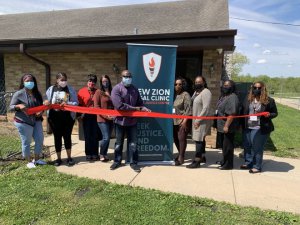When I was in school, I ran track. Track is not a team sport. I was part of a team, but I ran on my own. Justice in America is too much like that. Instead of coming alongside someone facing injustice, we point to the starting line and tell them to start running.
Justice as Olympic race
Justice should not be a track race. People should not be lined up so the one with the most money and power wins. The one with the most speed is fun when it is Usain Bolt but with real livelihood issues on the line, justice should not go only to the powerful.
Everyday people with legitimate claims and grievances are prevented from even getting to the starting line for lack of affordable access to counsel. Law is a competitive individual sporting event. Worse. Law doesn’t even give a sporting chance. There is only one team. Lawyers scrimmage against one another, but only lawyers can play. Trying to give legal advice as a non-lawyer is worse than doping. In most states it is a criminal offense.
With the average Illinois attorney fee topping $298/hr, higher elsewhere, one in three Americans simply cannot afford the high cost of a lawyer. Recently the World Justice Project released the 2021 Rule of Law Index report showing the United States fell from 110 to 126 out of 139 countries for providing affordable access to justice. We are last in developed nations. For a nation that pledges liberty and justice for all that should not be.
Reimagining Justice
What if Justice didn’t have to be a monopoly? What if instead of just one team holding expensive skirmishes, justice could be a team sport? We don’t rely solely on doctors for health care. Why can’t law have P.A.’s and R.N.’s and L.P.N.’s. Maybe we can.
Some states are reimagining justice. Washington has limited license legal technicians (LLLT’s) that can help people through the family law process. Unfortunately, this innovative approach will end in July 2022 and no new licenses will issue. California is deciding whether to implement a more expansive version which would allow paralegals and legal document preparers to be licensed to help with certain criminal issues, consumer debt, estates, guardianships, employment, and family law. Arizona adopted a narrower version earlier this year. Utah has a similar provision. Whether these new programs will gain traction remains to be seen.
Recently a major report by the National Center for Access to Justice emphasized the importance of addressing this opportunity to expand legal assistance through non-lawyers. The report highlighted how subject matter experts in housing and other distinct areas often know more than lawyers. The report concluded the legal profession should listen more to the community in designing solutions.
Justice should be a team sport
Injustice isolates. The pandemic heightened serious mental health issues that flow from isolation. Legal challenges exacerbate this isolation. Overwhelmed and confused people don’t know where to turn for help. Is the issue legal? Can anything be done? They don’t have time or resources to address it, but failure to address makes matters worse.
Administer Justice believes no one does justice alone and no one should face injustice alone. We believe justice is done in community. Intentionally based in neighborhood churches, we train a support team to surround a neighbor with community.
Administer Justice reimagines justice as necessary for human flourishing. For this to happen, justice should be as available as the local Walgreens. We can’t tell desperate people needing legal aid they’re on a six-month waiting list. That’s a death sentence. Justice should be immediately accessible.
Imagine churches opening their doors so every Saturday neighbors can find legal help. Even more, imagine clients learning justice is more than legal help. To administer true justice requires showing mercy and compassion to one another. Zech. 7:9.
If true justice is rooted in the love of Jesus, then it should be demonstrated through a caring support team. Finally, imagine a team continuing to walk alongside their neighbor, invite them to church, connect them to social resources, and free them from legal fear.
Community is where the magic happens. As one team member said, “I love being part of something bigger than myself.”
Great sports teams know it is not about one star player. Great teams know it is how every member contributes to the success of the whole. At Gospel Justice Centers, it’s not about the lawyer, it’s about the team. Everyone works together to provide holistic love and care to a neighbor in need.
Get in the game
Were you part of a team? You know the thrill of celebration, the disappointment of loss. To experience those highs and lows, you need to get in the game. Justice is NOT a spectator sport. God did not 
Do you feel alone in seeking justice? Join our AJ Book Club and find community through our online discussion of books addressing biblical justice. Our next discussion of Pursuing Justice will be led by the author Ken Wytsma. Registration is free and all are welcome.
Maybe your role is providing for the team as a donor. Or, maybe your role is promoting the team. Or perhaps your role is on the field as a volunteer. Do something. Join Team Justice. Visit our Volunteer page to find your role and get started.
Clients see the power of the team. As one client said this week, “I am so grateful for God’s teamwork among His children in Jesus Christ’s Mighty Name.”
Go get them, Team Justice.





